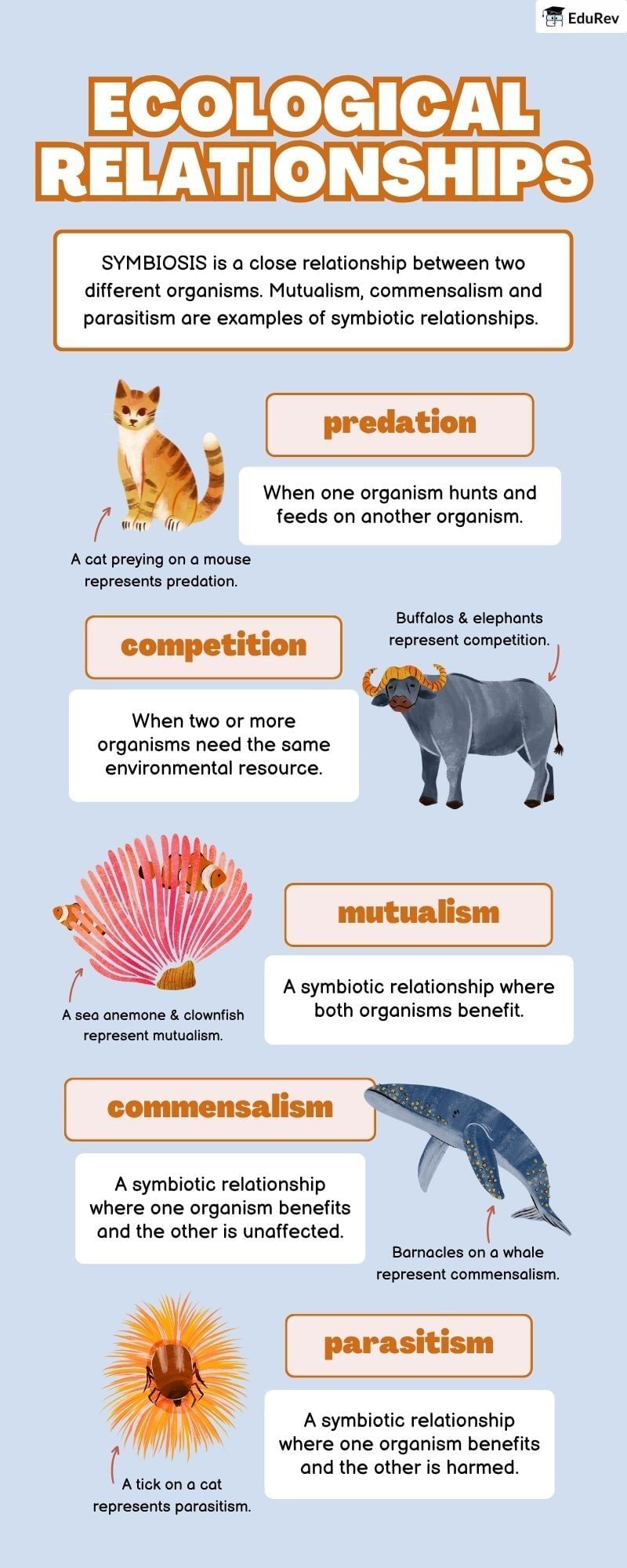NEET Exam > NEET Notes > Biology Class 12 > Infographics: Ecological Relationships
Infographics: Ecological Relationships | Biology Class 12 - NEET PDF Download

The document Infographics: Ecological Relationships | Biology Class 12 - NEET is a part of the NEET Course Biology Class 12.
All you need of NEET at this link: NEET
|
59 videos|290 docs|168 tests
|
FAQs on Infographics: Ecological Relationships - Biology Class 12 - NEET
| 1. What are ecological relationships and why are they important in ecosystems? |  |
Ans.Ecological relationships refer to the interactions between different species within an ecosystem. These relationships can be classified into various types, including predation, competition, mutualism, commensalism, and parasitism. Understanding these interactions is crucial because they help maintain ecological balance, support biodiversity, and ensure the survival of species. For instance, predator-prey dynamics control population numbers, while mutualistic relationships, like those between bees and flowering plants, promote reproductive success.
| 2. What is the difference between mutualism and commensalism? |  |
Ans.Mutualism is a type of ecological relationship where both species involved benefit from the interaction. An example is the relationship between bees and flowering plants, where bees obtain nectar for food, and plants achieve pollination. In contrast, commensalism is a relationship where one species benefits while the other is neither helped nor harmed. An example of commensalism is barnacles attaching to a whale; the barnacles gain mobility to nutrient-rich waters, while the whale remains unaffected.
| 3. How does competition affect species in an ecosystem? |  |
Ans.Competition occurs when two or more species vie for the same resources, such as food, water, or habitat. This interaction can lead to various outcomes, including competitive exclusion, where one species outcompetes another, leading to the latter's decline or extinction in that habitat. Alternatively, species may adapt to reduce competition, such as by altering their feeding habits or habitat preferences. Understanding competition is vital for conservation efforts as it can influence species diversity and ecosystem stability.
| 4. What role do predators play in maintaining ecological balance? |  |
Ans.Predators play a critical role in maintaining ecological balance by controlling the populations of prey species. This regulation prevents overpopulation, which can lead to habitat degradation and resource depletion. For example, wolves in a forest ecosystem help control deer populations, which in turn allows vegetation to thrive. This balance supports overall biodiversity and contributes to the health of the ecosystem. Without predators, certain species may dominate, disrupting the ecological equilibrium.
| 5. Can ecological relationships change over time, and what factors might influence these changes? |  |
Ans.Yes, ecological relationships can change over time due to various factors such as environmental changes, species introductions, climate shifts, and human activities. For instance, the introduction of an invasive species can disrupt existing relationships by outcompeting native species or altering habitat structures. Climate change can also shift species distributions, leading to new interactions or the breakdown of existing ones. Understanding these dynamics is essential for effective ecosystem management and conservation strategies.
Related Searches
















